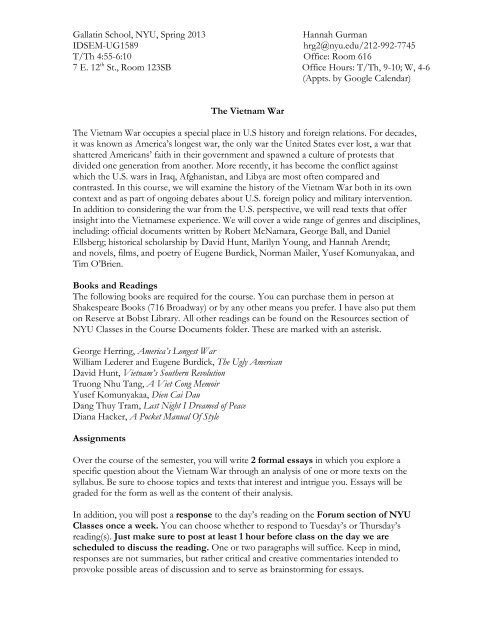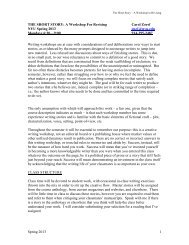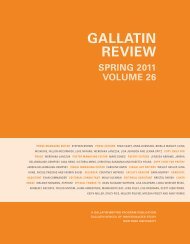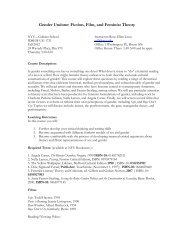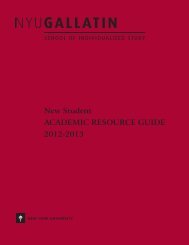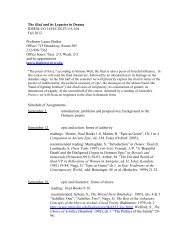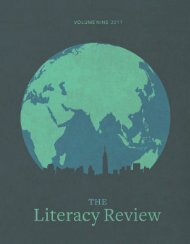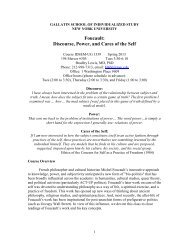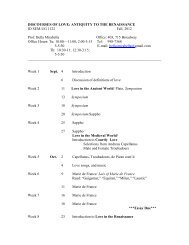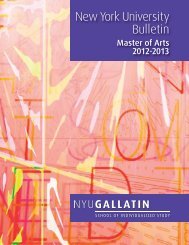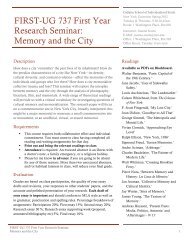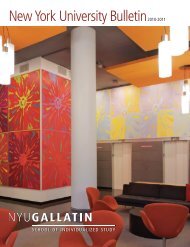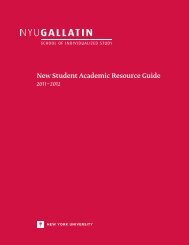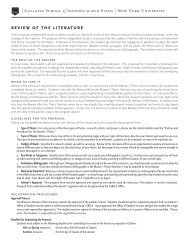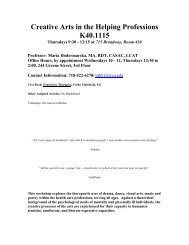Gallatin School, NYU, Spring 2013 Hannah Gurman IDSEM ...
Gallatin School, NYU, Spring 2013 Hannah Gurman IDSEM ...
Gallatin School, NYU, Spring 2013 Hannah Gurman IDSEM ...
You also want an ePaper? Increase the reach of your titles
YUMPU automatically turns print PDFs into web optimized ePapers that Google loves.
<strong>Gallatin</strong> <strong>School</strong>, <strong>NYU</strong>, <strong>Spring</strong> <strong>2013</strong><strong>Hannah</strong> <strong>Gurman</strong><strong>IDSEM</strong>-UG1589hrg2@nyu.edu/212-992-7745T/Th 4:55-6:10 Office: Room 6167 E. 12 th St., Room 123SB Office Hours: T/Th, 9-10; W, 4-6(Appts. by Google Calendar)The Vietnam WarThe Vietnam War occupies a special place in U.S history and foreign relations. For decades,it was known as America’s longest war, the only war the United States ever lost, a war thatshattered Americans’ faith in their government and spawned a culture of protests thatdivided one generation from another. More recently, it has become the conflict againstwhich the U.S. wars in Iraq, Afghanistan, and Libya are most often compared andcontrasted. In this course, we will examine the history of the Vietnam War both in its owncontext and as part of ongoing debates about U.S. foreign policy and military intervention.In addition to considering the war from the U.S. perspective, we will read texts that offerinsight into the Vietnamese experience. We will cover a wide range of genres and disciplines,including: official documents written by Robert McNamara, George Ball, and DanielEllsberg; historical scholarship by David Hunt, Marilyn Young, and <strong>Hannah</strong> Arendt;and novels, films, and poetry of Eugene Burdick, Norman Mailer, Yusef Komunyakaa, andTim O’Brien.Books and ReadingsThe following books are required for the course. You can purchase them in person atShakespeare Books (716 Broadway) or by any other means you prefer. I have also put themon Reserve at Bobst Library. All other readings can be found on the Resources section of<strong>NYU</strong> Classes in the Course Documents folder. These are marked with an asterisk.George Herring, America’s Longest WarWilliam Lederer and Eugene Burdick, The Ugly AmericanDavid Hunt, Vietnam’s Southern RevolutionTruong Nhu Tang, A Viet Cong MemoirYusef Komunyakaa, Dien Cai DauDang Thuy Tram, Last Night I Dreamed of PeaceDiana Hacker, A Pocket Manual Of StyleAssignmentsOver the course of the semester, you will write 2 formal essays in which you explore aspecific question about the Vietnam War through an analysis of one or more texts on thesyllabus. Be sure to choose topics and texts that interest and intrigue you. Essays will begraded for the form as well as the content of their analysis.In addition, you will post a response to the day’s reading on the Forum section of <strong>NYU</strong>Classes once a week. You can choose whether to respond to Tuesday’s or Thursday’sreading(s). Just make sure to post at least 1 hour before class on the day we arescheduled to discuss the reading. One or two paragraphs will suffice. Keep in mind,responses are not summaries, but rather critical and creative commentaries intended toprovoke possible areas of discussion and to serve as brainstorming for essays.
Grading:-Essay 1: 5-7 pages (25%)-Essay 2: 8-10 pages (35%)-Responses: (25%) (Graded as One Unit: Satisfactory Completion of All Responses=A; onehalfletter grade penalty for each missing response)-Participation: (15%):-Extra Credit: Timeline or EditorialParticipation Requirements:Participation is key for your success in this course. In addition to coming to class regularlyand on time, participation includes:1) Completion of all reading assignments; bring hard copy of readings to class4) Regular and Thoughtful Contributions to Class Discussion5) Respectful Engagement with OthersAttendance Policy: You are allowed 3 unexcused absences, no questions asked. Except forextenuating circumstances, additional absences will be penalized.Late Papers: Unless you have made other arrangements with me, late papers will bepenalized.On Plagiarism and Academic Integrity: A description of <strong>Gallatin</strong>’s academic integritypolicy, including plagiarism and its consequences, can be found at the following link:http://www.gallatin.nyu.edu/academics/policies/policy/integrity.htmlJan. 29:Course Introduction: Why Study the Vietnam War?Unit 1: Prelude to WarJan. 31:Intro: Background on the Cold War/Vietnam War-Andrew Rotter, “Chronicle of a War Foretold: The United States andVietnam”*-Herring, chapter 1Feb. 5: -Lederer and Burdick, The Ugly American (pgs. 1-42)-Michael Latham, “Redirecting the Revolution?: The USA and the Failure ofNation Building in South Vietnam”*2
Feb. 7: Lederer and Burdick, The Ugly American (pgs. 43-190)Feb 12: Lederer and Burdick, The Ugly American (pgs. 191-285)Feb 14: Hunt, Vietnam’s Southern Revolution (chs. 1-3)[Assign Essay 1]Feb. 19: Truong Nhu Tang, A Viet Cong Memoir (chs. 1, 2, 9, 14)Unit 2: EscalationFeb. 21:Feb. 26:-Leslie Gelb, “Picking Up the Torch: The Kennedy Administration” in TheIrony of Vietnam, 69-95*Essay 1 DueJohnson’s War and the Logic of Escalation:-Herring, chapter 4Feb. 28: -Lyndon Johnson, Vantage Point (ch. 11)*-Notes of Cabinet Meeting, July 22, 1965, FRUS, Vietnam, 1965, 209-217*-Table of Troop Numbers*Mar. 5: -Herring, chapter 5-Marilyn Young, “Bombing Civilians From the Twentieth Century toToday”*Mar. 7:Mar 12:Mar 14:Mar. 19:Mar. 21:-George Ball, “A Light That Failed,” 1964 Dissent Memo*-<strong>Gurman</strong>, “Revising the Vietnam Balance Sheet”*Hearts and Minds (screening)Hearts and Minds (discussion)SPRING BREAK—NO CLASSSPRING BREAK—NO CLASSUnit 3: The Soldier’s Perspective:Mar. 26:Mar. 28:Tim O’Brien, The Things They Carried (“The Things They Carried,” “On theRainy River,” “How to Tell a True War Story,” “Ambush,” “Field Trip”)*Yusef Komunyakaa, Dien Cai Dau [book]3
Apr. 2:Apr. 4:Apr. 9:-Dang Thuy Tram, Last Night I Dreamed of Peace (intro-page 168) [book]-Hunt, chapter 6-Last Night I Dreamed of Peace (171-end)-Christina Schwenkel, “Contested Truths: Museums and Regimes ofRepresentation and Objectivity”*Winter Soldier (film discussion)-Herring, chapter 7Unit 4: ProtestsApr. 11:-Noam Chomsky, “The Function of the University in a Time of Crisis”*Columbia Student Protest film (screening)Apr. 16: Jeremi Suri, “The Rise and Fall of An International Counterculture, 1960-1975”*[Assign Essay 2]Apr 18:Apr. 23:Apr. 25:-Norman Mailer, The Armies of the Night (Book I, Part 1, #s 1-2; Book I, Part2; Book II, Part 1, #s1-2; Part XI) (pgs. 3-10, 53-79, 219-230, 288)*-“Why Are We in Vietnam?” last chapter*Katherine Kinney, “Hanoi Jane and Other Treasons: Women and theEditing of the 1960s”*The Pentagon Papers:<strong>Hannah</strong> Arendt, “Lying in Politics”*Unit 5: The End and Legacy of the WarApr. 30:-Melvin Laird, “Iraq: Learning the Lessons of Vietnam” Foreign Affairs (Nov-Dec 2005): 22-4*-Herring, chapter 8May 2: Truong Nhu Tang, A Viet Cong Memoir (chs. 21, 22, 24)May 7:May 9:-Hà Dang, “What is doimoi? From where did it start?”*-Do Nguyen Phuong, “Economic growth coupled with social advancementand justice”*-Linh Dinh, “Eating Fried Chicken”*-Marilyn Young, “Counterinsurgency: Now and Forever”*-Obama’s West Point Speech, Dec. 1, 2009*Essay 2 Due4


